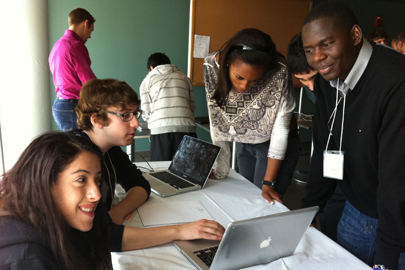Computing Symposium aims to expand diversity
Attendance and project submissions nearly doubled since last year's event

Students at the New England Undergraduate Computing Symposium, held at the Shaprio Science Center.
“One of the main reasons that we started this is to try to increase the diversity in computer science departments in New England,” said Timothy Hickey, professor of computer science. “Ideally 50 percent of computer science majors would be female, and it’s more like 10 or 15 percent.”
Hickey said the team who organized the event, which included professors from Boston University, Tufts University, and Wellesley College, worked to ensure there would be a good representation of women in order to help dispel the myth that computer science is a male-dominated field.
Likewise for students of color, Hickey said, citing that there are very few students of color in computer science departments in the U.S. in general, and in New England in particular. “We’re trying to increase diversity by building community within New England,” said Hickey. “If you can show that there are undergraduate women in New England who are doing very cool things in computer science, that may help dispel the myth that it’s a male field.”
The projects ranged from creative homework assignments from classes, independent research projects, senior honors thesis projects, software built for fun and computing projects focusing on areas such as biology, physics and social networks.
Six teams were selected to present their work in front of the assembled body of students and faculty. At the end of the day, five prizes were awarded to project teams —two of which went to Brandeis teams.
Students attended a career panel with five professional software engineers, four of whom were women, and discussed strategies for combating subtle and overt gender discrimination as well as the joys of being an engineer in today's information economy. They also had the opportunity to meet one on one with software professionals during a career networking session.
“We had a variety of companies, from large, successful corporations like Google and IBM, to moderate-sized companies both for-profit and non-profit,” said Hickey.
Those included companies such as Pegasystems, Mathworks, Mozilla, Rocket Software to educational and government-funded labs, like MITRE, LL, Brandeis LTS, startups (LiquidBits, InventivHealth, Infomous, Shareaholic), pre-startups (Web Bootup), and proselytizers for straight entrepreneurship (TechStars).
Keynote speaker was D. Fox Harrell, associate professor of digital media from MIT, who spoke about computational identity and the Living Liberia Fabric Project, which uses artificial intelligence (AI) and machine learning to provide automatic personalized tours of the video collected by the Liberia Truth and Reconciliation Commission.
Hickey warns that the nation needs more computer scientists.
“We’re projected to produce half the number of computer scientists that we need over the next decade,” said Hickey. “We’re hoping that events like this will encourage freshmen and sophomores to think about computer science as a major.”
Categories: Research, Science and Technology





